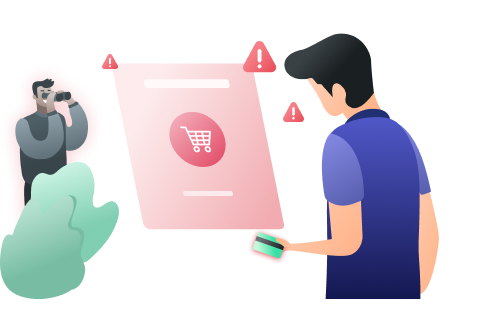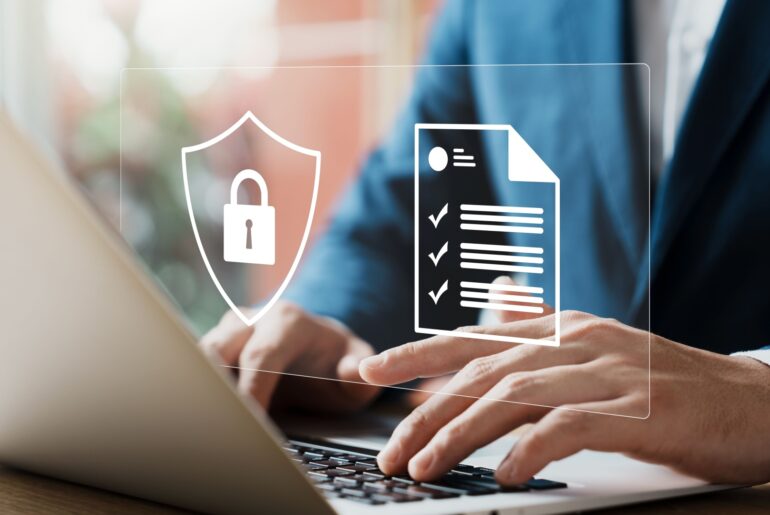Scams: they’re everywhere you look, but how can you avoid them? Internet users around the world have experienced scam attacks that seek to steal their data. While it can seem nearly impossible to navigate around fraudulent websites and applications, there is hope. In this article, we’ll give you some surefire tips on how to avoid online scams.
What are Online Scams?
Simply put, an online scam is any attempt by a cybercriminal to steal data or financial information. This can happen in a variety of ways. You may be familiar with the idea of phishing or even SMS scams. Ultimately, the goal of an online scam is to trick a user into surrendering personal information that can then be manipulated by the fraudster.
Most online scams are easy to detect if you know what to look for. Being able to identify a scam early is important, especially if you want to avoid being caught up in the scam itself. If you notice a suspicious email or direct message, you should either report it or bring it up with your system administrator. Otherwise, being educated on the different signs of a scam is going to be your best defense.

What Are the Signs of a Scam?
To effectively avoid online scams, you will need to learn how to identify them. Of course, this has become progressively more challenging as cybercriminals adopt more sophisticated techniques. Staying up-to-date on the latest scams and knowing how to spot them is a great way to protect yourself from a potential attack. Take a look at the following list of signs that you may be dealing with a scam:
- You are asked to pay using unconventional methods, like gift cards or wire transfers.
- Someone contacts you, fraudulently representing a legitimate organization or company.
- You are threatened with violence, legal action, etc. for not complying with their request.
- Someone mentions that you won a prize or that you owe them money.
Avoiding scams may seem hard, especially with fraudsters lurking around every corner, but now that you know how to identify a scam, you can avoid it. Knowledge is only half the battle, which means the other half is being proactive about your safety both online and on the go.

How to Avoid Online Scams
Let’s say you’ve begun to notice one or two unwanted text messages from spammy numbers. You soon begin to notice suspicious messages in your inbox and on social media. All of these are well-known forms of online scams, but how can you truly avoid them? Even though they seem like they are everywhere you turn, online scams can be swept to the side with the right approach. Let’s take a look at some of the best ways to avoid online scams:
- Never give personal information to someone representing an organization unless you knew ahead of time that they would contact you.
- Always avoid requests that ask you to pay with a specific method, e.g. gift cards.
- Research the name and number contacting you.
- Don’t pay anyone who demands that you pay them immediately.
- Block any phone numbers that seem suspicious.
- Avoid clicking on unfamiliar links in your email.
If you experience an online scam, don’t panic. After you have taken the time to secure your personal information and contact your bank, you can report the scam to the FTC. Just visit the Federal Trade Commission website and submit a claim directly to them.

Increase Your Online Security for More Protection
Cybercriminals will stop at nothing to get what they want from their victims. This is just one of the many reasons that keeping yourself safe online is a practice that you have to maintain 24/7. Being vigilant about your online security and privacy is one of the most reliable methods of ensuring your continued safety on the Internet. But what does that mean, necessarily? It means following basic online safety practices and keeping yourself informed about the latest cybersecurity risks. Take a look at some of the following tips for giving yourself more protection on the Internet:
- Use two-factor authentication on all of your devices and accounts.
- Update your password every three to four months.
- Use a strong, unique password across all of your profiles.
- Always check an app or website’s privacy policy.
- Avoid using unsecured or public Wi-Fi networks.
- Ensure that your device has the latest software updates.
- Use a combination of a VPN and antivirus software.
It’s not always easy to avoid online scams, especially with so many fraudulent websites and dangerous apps on the market. With cybercriminals creating advanced methods of fraud, it’s never been more necessary to have online security on all of your devices.
Powerful Online Protection with PrivadoVPN
Scams and fraud are rampant on the Internet, but protecting yourself is easier than ever before. PrivadoVPN makes it simple to get yourself the level of security and privacy that you need. With the ability to create up to 10 connections from one account, you can protect all of your personal devices as well as anyone under your roof. PrivadoVPN provides powerful encryption protocols, unlimited speeds, and unlimited data each month. If you’re looking for first-class protection, you need PrivadoVPN. Sign up today!
Download PrivadoVPN
Protect your privacy with a world-class VPN. Sign up for premium access to PrivadoVPN and get unlimited monthly data, access to 300+ servers from around the world, and up to 10 simultaneous connections. Get a top-rated VPN that can secure your privacy at home, at work, or on the go.
Sign up for PrivadoVPN today!




